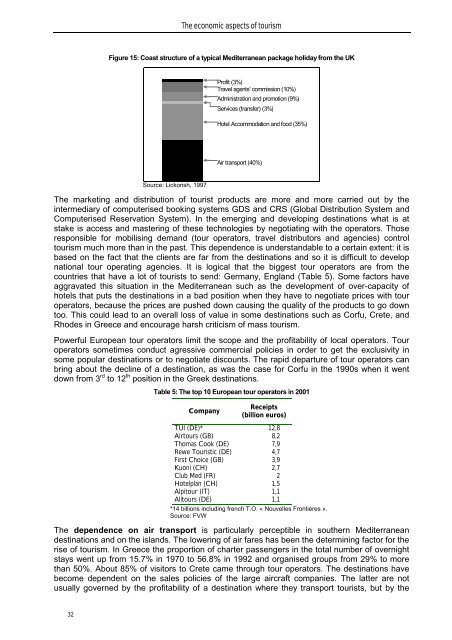dossier sur le tourisme et le développement durable
dossier sur le tourisme et le développement durable
dossier sur le tourisme et le développement durable
Create successful ePaper yourself
Turn your PDF publications into a flip-book with our unique Google optimized e-Paper software.
32<br />
The economic aspects of tourism<br />
Figure 15: Coast structure of a typical Mediterranean package holiday from the UK<br />
Source: Lickorish, 1997<br />
Profit (3%)<br />
Travel agents' commission (10%)<br />
Administration and promotion (9%)<br />
Services (transfer) (3%)<br />
Hotel Accommodation and food (35%)<br />
Air transport (40%)<br />
The mark<strong>et</strong>ing and distribution of tourist products are more and more carried out by the<br />
intermediary of computerised booking systems GDS and CRS (Global Distribution System and<br />
Computerised Reservation System). In the emerging and developing destinations what is at<br />
stake is access and mastering of these technologies by negotiating with the operators. Those<br />
responsib<strong>le</strong> for mobilising demand (tour operators, travel distributors and agencies) control<br />
tourism much more than in the past. This dependence is understandab<strong>le</strong> to a certain extent: it is<br />
based on the fact that the clients are far from the destinations and so it is difficult to develop<br />
national tour operating agencies. It is logical that the biggest tour operators are from the<br />
countries that have a lot of tourists to send: Germany, England (Tab<strong>le</strong> 5). Some factors have<br />
aggravated this situation in the Mediterranean such as the development of over-capacity of<br />
hotels that puts the destinations in a bad position when they have to negotiate prices with tour<br />
operators, because the prices are pushed down causing the quality of the products to go down<br />
too. This could <strong>le</strong>ad to an overall loss of value in some destinations such as Corfu, Cr<strong>et</strong>e, and<br />
Rhodes in Greece and encourage harsh criticism of mass tourism.<br />
Powerful European tour operators limit the scope and the profitability of local operators. Tour<br />
operators som<strong>et</strong>imes conduct agressive commercial policies in order to g<strong>et</strong> the exclusivity in<br />
some popular destinations or to negotiate discounts. The rapid departure of tour operators can<br />
bring about the decline of a destination, as was the case for Corfu in the 1990s when it went<br />
down from 3 rd to 12 th position in the Greek destinations.<br />
Tab<strong>le</strong> 5: The top 10 European tour operators in 2001<br />
Company<br />
Receipts<br />
(billion euros)<br />
TUI (DE)* 12,8<br />
Airtours (GB) 8,2<br />
Thomas Cook (DE) 7,9<br />
Rewe Touristic (DE) 4,7<br />
First Choice (GB) 3,9<br />
Kuoni (CH) 2,7<br />
Club Med (FR) 2<br />
Hotelplan (CH) 1,5<br />
Alpitour (IT) 1,1<br />
Alltours (DE) 1,1<br />
*14 billions including french T.O. « Nouvel<strong>le</strong>s Frontières ».<br />
Source: FVW<br />
The dependence on air transport is particularly perceptib<strong>le</strong> in southern Mediterranean<br />
destinations and on the islands. The lowering of air fares has been the d<strong>et</strong>ermining factor for the<br />
rise of tourism. In Greece the proportion of charter passengers in the total number of overnight<br />
stays went up from 15.7% in 1970 to 56.8% in 1992 and organised groups from 29% to more<br />
than 50%. About 85% of visitors to Cr<strong>et</strong>e came through tour operators. The destinations have<br />
become dependent on the sa<strong>le</strong>s policies of the large aircraft companies. The latter are not<br />
usually governed by the profitability of a destination where they transport tourists, but by the
















